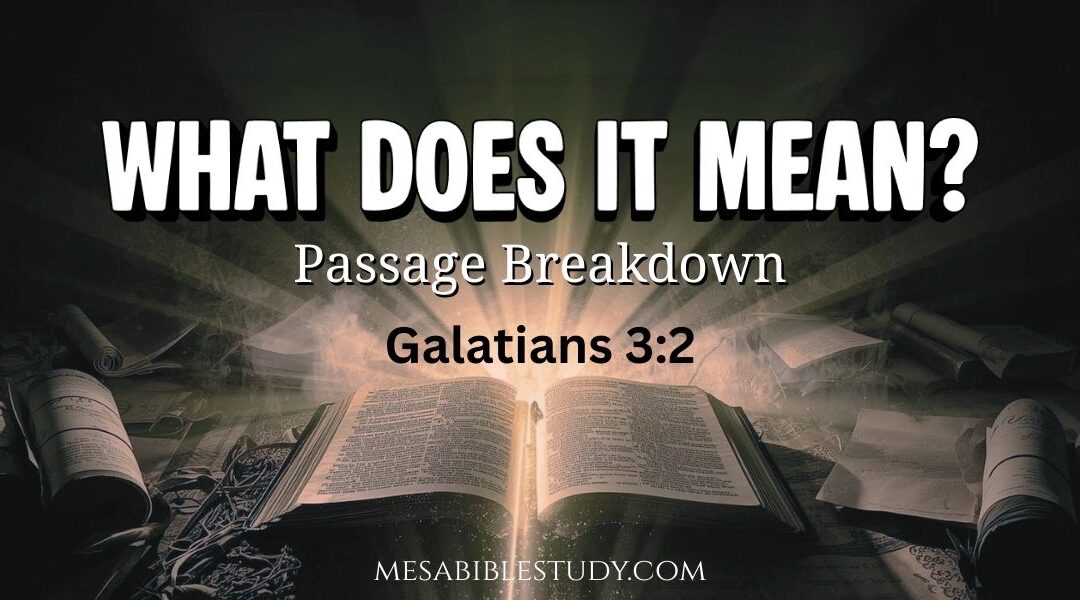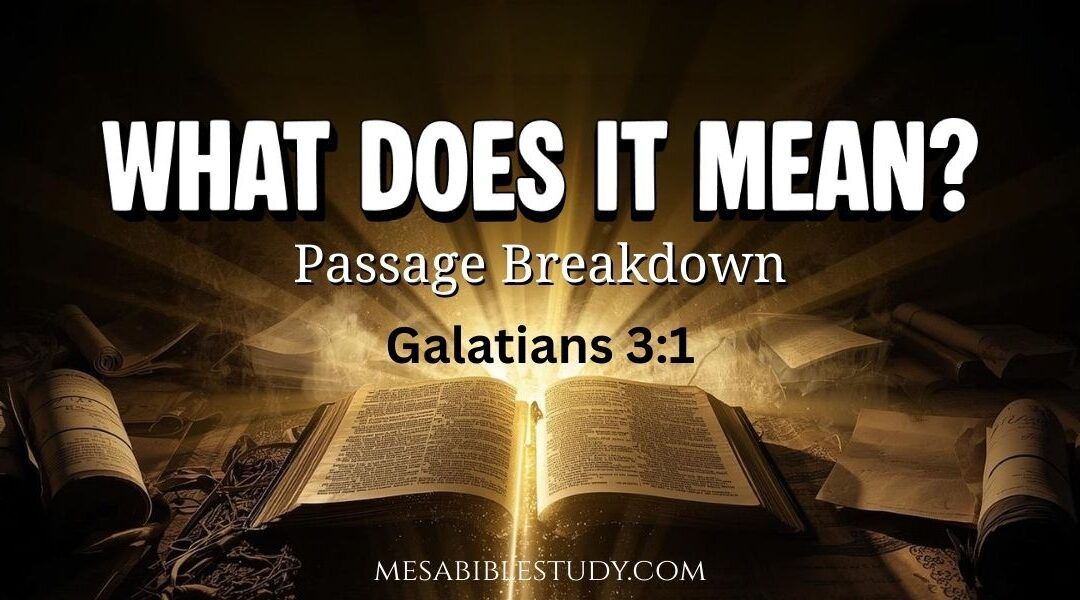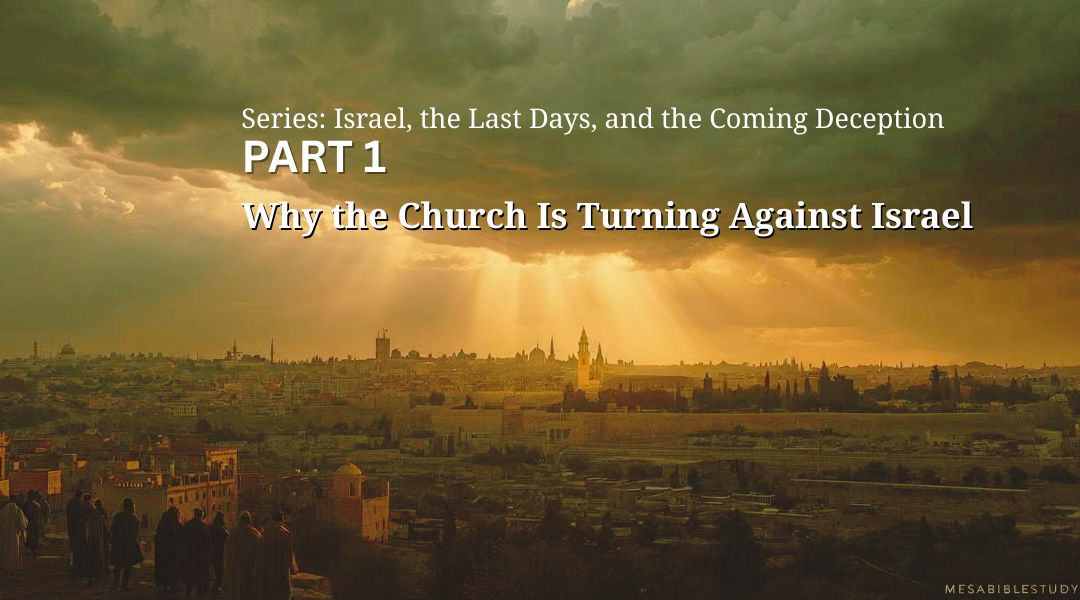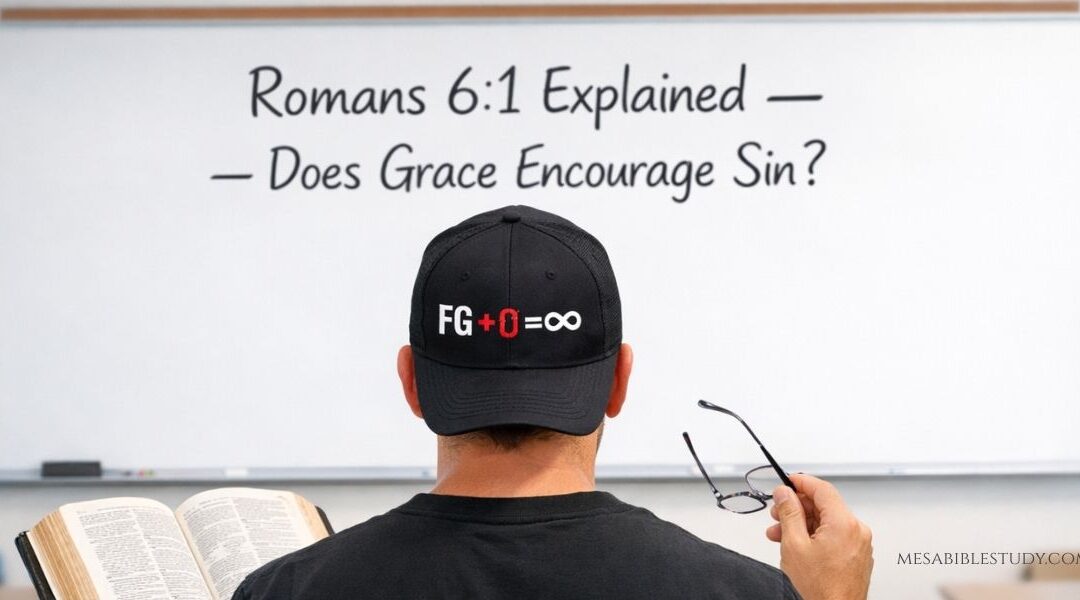
by Jamie Pantastico | Jan 14, 2026 | Verse-by-Verse Bible Studies |
📖 Passage Breakdown — Galatians 3:2
“This only I want to learn from you: Did you receive the Spirit by the works of the law, or by the hearing of faith?”
📜 Background, Setting & Purpose
✍️ Author
Paul the Apostle.
👥 Written To
Gentile believers in the churches of Galatia who had been justified by faith alone through Paul’s gospel.
⏲️ When
Approximately A.D. 48–49, shortly after Paul’s first missionary journey and just before the Jerusalem Council (Acts 15).
🌍 Setting & Purpose (Why Paul Is Asking This)
False teachers from Jerusalem had infiltrated Paul’s Gentile churches, teaching that faith in Christ was not enough—that believers must also keep the Mosaic Law, be circumcised, and submit to Israel’s religious system in order to be truly saved.
Paul had already been preaching justification by faith alone apart from the Law for nearly ten years. He had planted the Galatian churches around A.D. 45, and sometime before the Jerusalem Council (A.D. 51), these legalistic teachers came in to “spy out” the liberty believers had in Christ (Gal. 2:4) and to bring them back into bondage.
This was not a secondary issue. The risen, glorified Lord Jesus Himself sent Paul to Jerusalem to confront this threat because the truth of the gospel was at stake (Gal. 2:2–5). If Paul had yielded, even briefly, the gospel of grace would have been compromised for every believer who followed.
Galatians 3:2 is Paul pressing that confrontation directly onto the Galatian believers themselves.
📖 Immediate Context
In Galatians 3:1, Paul rebuked them for being spiritually deceived—moving away from Christ crucified alone.
Now in verse 2, he does something devastatingly simple:
He appeals to their own conversion.
No theology debate.
No appeal to tradition.
No rabbinic argument.
Just one question.
✨ Phrase-by-Phrase Breakdown
“This only I want to learn from you…”
Paul strips the issue down to one undeniable reality.
The entire debate about law and grace stands or falls on this.
“Did you receive the Spirit…”
Receiving the Holy Spirit is:
- the proof of salvation
- the seal of justification
- the evidence of belonging to Christ
If they received the Spirit, they were already saved.
“…by the works of the law…”
Paul forces the absurdity into the open.
They were Gentiles.
They were not under the Law.
They were not circumcised.
They were not temple worshipers.
The Law did not give them the Spirit.
“…or by the hearing of faith?”
They heard Paul preach Christ crucified.
They believed.
God gave them the Spirit.
Grace came first.
The Spirit came first.
Law came never.
❌ What This Verse Does Not Mean
- Not that works help secure salvation
- Not that law contributes to spiritual life
- Not that faith and law cooperate
- Not that grace is incomplete
✅ What This Verse Does Mean
- Salvation begins by faith alone
- The Spirit is given at the moment of belief
- Law does not produce life
- Grace does
- Your own conversion proves it
📘 Doctrinal Summary
Galatians 3:2 is Paul’s unanswerable argument for justification by faith alone. The Galatians received the Holy Spirit (salvation)—not by law (works), ritual, or obedience—but by believing the gospel Paul preached. Their own salvation exposes the lie of legalism. Works do not maintain salvation because works never produced it. To move from faith to law is not spiritual growth; it is a denial of how God gives life.

by Jamie Pantastico | Jan 14, 2026 | Verse-by-Verse Bible Studies |
📖 Passage Breakdown — Galatians 3:1
“O foolish Galatians! Who has bewitched you that you should not obey the truth, before whose eyes Jesus Christ was clearly portrayed among you as crucified?”
📜 Background, Setting & Purpose
✍️ Author
Paul the Apostle.
👥 Written To
The churches in Galatia — Gentile believers who had been saved by faith alone through Paul’s gospel.
⏲️ When
Approximately A.D. 48–49, shortly after Paul’s first missionary journey.
🌍 Setting & Purpose of Galatians (book-level)
Galatians was written to confront a doctrinal crisis. False teachers from Jerusalem had infiltrated Paul’s Gentile congregations, teaching that faith in Christ was not enough—that believers must also be circumcised and live under the Mosaic Law in order to be truly saved.
By the time Paul wrote Galatians, he had already been preaching justification by faith alone apart from the Law for nearly ten years. He had planted churches across the Gentile world, including the Galatian churches during his first missionary journey around A.D. 45.
Sometime between that journey and the Jerusalem council in A.D. 51, men from Jerusalem came into Galatia to “spy out” the liberty believers had in Christ and to undermine Paul’s gospel (Gal. 2:4). These were not harmless misunderstandings but a coordinated effort to bring Gentile believers under Israel’s Law.
It is crucial to understand that Paul did not go up to Jerusalem on his own initiative. The risen, glorified Lord Jesus directed him to confront the leadership there because the truth of the gospel was at stake (Gal. 2:2–5). If Paul had yielded—even for a moment—the gospel of grace would have been compromised for all believers.
As Acts 17 reminds us, believers must be like the Bereans—examining the Scriptures daily to see whether these things are so. When we do, the gravity of Galatians becomes unmistakable: this book was written to defend the gospel of grace against religious corruption. The same religious corruption that exist today.
📖 Immediate Context
Galatians 1–2 establishes:
- Paul received his gospel by revelation from Christ (1:11–12)
- The Jerusalem apostles added nothing to his message (2:6)
- Justification is by faith alone, not works of the Law (2:16)
Galatians 3:1 marks a turning point where Paul directly confronts the Galatians for abandoning what they had already believed.
✨ Phrase-by-Phrase Breakdown
“O foolish Galatians!”
“Foolish” does not mean unintelligent — it means spiritually irrational.
They knew the truth, but they had abandoned it.
Paul is not attacking their minds; he is confronting their departure from grace.
“Who has bewitched you…”
“Bewitched” means to deceive, to spiritually manipulate, to lead astray through false teaching. Paul is saying this was not an innocent misunderstanding—it was doctrinal deception.
False teaching does not merely misinform; it enslaves. Paul’s question is designed to force the Galatians to confront who had been tampering with their thinking, just as the Lord Jesus often did when exposing spiritual deception (cf. Matt. 16:13–17).
“…that you should not obey the truth…”
“Obey” here does not mean works-based obedience.
It means to submit to what is true.
They had stopped trusting what God had already revealed through Paul.
The issue is believing the gospel, not performing religious duties.
“…before whose eyes Jesus Christ was clearly portrayed among you as crucified?”
This is the heart of the verse.
Paul had preached Christ crucified — not Christ plus law, not Christ plus rituals, not Christ plus self-effort.
“Clearly portrayed” means the cross had been publicly, vividly, unmistakably presented.
The Galatians were not confused about Christ and what He accomplished at the cross on their behalf.
They were being moved away from the cross alone. Adding works to God’s amazing grace therefore making it no longer grace. Romans 11:6.
❌ What This Verse Does Not Mean
- Not that the Galatians lost their salvation
- Not that Christ’s work was incomplete
- Not that grace was unclear
- Not that obedience to law saves
The problem was abandoning the sufficiency of the cross.
✅ What This Verse Does Mean
- The gospel of grace can be quickly corrupted
- Faith-alone justification is always under attack
- Legalism is spiritual deception
- Christ crucified is the center of God’s saving message
- Moving from grace to law is moving away from Christ
🔗 Cross-References for Going Deeper
Galatians 2:16 — Justified by faith, not works
Galatians 5:1 — Stand fast in liberty
Romans 3:28 — Faith apart from works
Colossians 2:8 — Beware of human tradition
2 Corinthians 11:3 — Minds corrupted from simplicity in Christ
📘 Doctrinal Summary
Galatians 3:1 exposes the spiritual danger of moving away from the gospel of grace. The Galatians had been saved by believing in Christ crucified, yet they were being drawn into law-based religion that added human effort to divine accomplishment. Paul makes clear that abandoning justification by faith alone is not spiritual growth—it is spiritual deception. Christ’s cross is not merely the beginning of salvation; it is the entire basis of it. Any system that adds law, works, or religious performance to the finished work of Christ is a departure from the truth.
Continue the study: Galatians 3:1 exposes the deception pulling believers away from Christ crucified. Galatians 3:2 brings Paul’s decisive test—how did you receive the Holy Spirit: by faith or by law? Read the next verse to see how Paul proves justification is by faith alone.

by Jamie Pantastico | Jan 12, 2026 | Israel and Bible Prophecy |
Prophetic Causes and Consequences
A Defining Moment: October 7, 2023
October 7, 2023, was not merely another tragic day in the Middle East. It was a moral and prophetic fault line.
On that day, Jewish civilians in Israel were subjected to unspeakable acts of brutality—mass murder, torture, rape, and abduction. These were not acts of war between armies; they were atrocities against families, children, and the elderly.
What followed should have been unambiguous moral clarity—especially from the Church.
Instead, October 7 exposed something far more alarming: a theological collapse already underway.
Within days, and then weeks, voices within Christendom—particularly in America—began reframing the massacre. Condemnation gave way to qualification. Sympathy gave way to suspicion. Moral outrage gave way to ideological narratives. The suffering of Jewish civilians was quickly eclipsed by accusations against Israel’s very existence.
This marked a turning point.
For decades, much of American Protestantism quietly held to replacement theology while maintaining public silence about modern Israel. Israel’s right to exist was generally left uncontested, even by those who believed the Church had replaced her spiritually.
After October 7, that restraint vanished.
Mainline Protestant denominations, pastors, theologians, and Christian commentators—many of whom had never spoken publicly against Israel or the Jewish people—now do so openly and aggressively. What was once implied is now explicit:
Israel has no biblical standing.
The Church is Israel.
The Jewish state is a theological error.
This shift did not originate from Scripture.
It originated from ideology.
And Scripture warned us this moment would come.
“All nations of the earth are gathered against it.”
— Zechariah 12:3
October 7 did not cause the Church’s turn against Israel.
It revealed it.
The event acted as a catalyst, pulling back the curtain on a theology that had long been present but rarely spoken aloud. In that sense, October 7 stands as a prophetic marker—not because of what Israel did or did not do afterward, but because of how the Church responded.
When moral clarity collapses after such evil, the issue is no longer political.
It is spiritual blindness.
This is why the Church is turning against Israel now—and why the consequences will not remain confined to theology.
A noticeable shift is taking place within the modern Church—and it is accelerating.
Christians who once affirmed God’s covenant with Israel are now questioning it. Others have moved beyond questioning and are openly opposing Israel, dismissing biblical prophecy, and framing support for the Jewish people as political, naïve, or even immoral.
This shift is not random.
It is not merely political.
And it is not accidental.
It is prophetic.
Scripture warned that this would happen—and it also warned of the consequences.
1. The Foundational Cause: Replacement Theology Has Returned
At the root of the Church’s growing hostility toward Israel is an old error with a new voice: Replacement Theology.
This doctrine teaches—explicitly or implicitly—that:
- Israel has forfeited her promises
- The Church has replaced Israel
- National Israel has no future in God’s plan
- Old Testament prophecies are spiritualized or reassigned
Yet Paul confronts this head-on:
“Has God cast away His people? Certainly not!”
— Romans 11:1
Replacement theology does not arise from Scripture—it arises from ignoring Romans 9–11, the very chapters written to prevent this error.
When the Church stops teaching these chapters, arrogance toward Israel always follows.
2. The Spiritual Cause: Israel Remains Central to God’s Prophetic Plan
Israel is not peripheral to prophecy—it is essential.
Consider what Scripture ties directly to Israel:
- The Second Coming of Christ (Zech. 12:10; Matt. 23:39)
- The Tribulation timeline (Dan. 9:24–27)
- The Millennial Kingdom (Isa. 2; Mic. 4; Zech. 14)
- The vindication of God’s name before the nations (Ezek. 36:22–23)
If Israel matters prophetically, then Satan’s opposition to Israel is unavoidable.
Hostility toward Israel is not merely ideological—it is spiritual warfare.
3. The Cultural Cause: The Church Has Adopted the World’s Moral Framework
Much of the modern Church now interprets the world through categories such as:
- Oppressor vs. oppressed
- Colonizer vs. colonized
- Power vs. victim
These categories are not biblical—they are ideological.
When this framework is applied, Israel is automatically cast as the villain, regardless of facts, history, or Scripture. Once Christians accept this lens, biblical truth becomes secondary to cultural approval.
“Do not be conformed to this world…”
— Romans 12:2
4. The Doctrinal Cause: Prophecy Has Been Mocked and Abandoned
Prophecy used to be taught carefully—even reverently.
Today it is:
- mocked as speculative
- dismissed as “fear-based”
- labeled divisive
- treated as irrelevant
Yet prophecy comprises nearly one-third of Scripture.
When prophecy is discarded, Israel becomes unintelligible—and when Israel becomes unintelligible, hostility follows.
5. The Historical Pattern: Theology Always Shapes Behavior
History is soberingly consistent:
When the Church affirms Israel → Jews are protected.
When the Church replaces Israel → Jews are persecuted.
From the early Church councils to the Reformation to 20th-century Europe, the pattern never changes.
Bad theology always produces real-world consequences.
6. The Prophetic Alignment: Zechariah 12 Is Coming into Focus
God declared:
“I will make Jerusalem a cup of trembling to all the surrounding peoples… and all nations of the earth will be gathered against it.”
— Zechariah 12:2–3
This includes:
- Governments
- Institutions
- Media
- And yes—religious systems
The Church is not immune to this alignment if it abandons Scripture.
7. The Consequence: A Dividing Line Is Being Drawn
Two expressions of Christianity are emerging:
The Remnant
The Apostate
- Spiritualizes Scripture
- Rejects Israel
- Mocks prophecy
- Blends with culture
- Embraces arrogance
Paul warned Gentile believers:
“Do not boast against the branches… remember that you do not support the root, but the root supports you.”
— Romans 11:18
Conclusion: Why This Matters Now
This is not an academic debate.
This is a test of faithfulness.
How the Church responds to Israel reveals how it handles:
- Scripture
- Covenant
- Prophecy
- Authority
- Humility
The turning of the Church against Israel is not a sign of enlightenment—it is a sign of drift.
And drift always precedes judgment.
Explore the Series
← Previous | 📖 Series Home | Next →

by Jamie Pantastico | Jan 9, 2026 | Verse-by-Verse Bible Studies |
📖 Passage Breakdown — Romans 6:2
“Certainly not! How shall we who died to sin live any longer in it?”
🔗Companion Passage: Romans 6:1 raises the objection to grace. Romans 6:2 answers it.
Together, these verses explain why faith-alone justification does not encourage sin but establishes a new identity in Christ.
📜 Background, Setting & Purpose
✍️ Author
Paul the Apostle, writing under the inspiration of the Holy Spirit.
👥 Written To
Believers in Rome — justified saints, both Jew and Gentile, who are now learning how grace reshapes life after salvation.
⏲️ When
~A.D. 57, near the end of Paul’s third missionary journey.
🌍 Setting & Purpose of Romans (book-level)
Romans unfolds in clear stages:
- Chapters 1–3 — universal guilt
- Chapters 3–5 — justification by faith alone
- Chapters 6–8 — sanctification grounded in identity, not law
- Chapters 9–11 — Israel and God’s plan
- Chapters 12–16 — practical Christian living
Romans 6 does not revise justification.
It explains the new reality created by justification.
📖 Immediate Context (Romans 6:1)
Paul has just raised the objection:
“Shall we continue in sin that grace may abound?”
Romans 6:2 is Paul’s strongest possible denial of that conclusion.
✨ Phrase-by-Phrase Breakdown
“Certainly not!”
This is one of the strongest negatives in Greek (mē genoito).
It means:
- God forbid
- Never
- May it never be
- Absolutely not
Paul does not soften grace to avoid abuse.
He rejects the conclusion outright.
“How shall we…”
This question shifts the focus from permission to possibility.
Paul is not saying believers shouldn’t sin.
He is asking how it is even consistent with who they now are.
“…who died to sin…”
This is the doctrinal heart of the verse.
“Died to sin” does not mean:
- Sinless perfection
- Inability to sin
- No longer committing acts of sin
It means:
- A decisive break in relationship
- Sin no longer reigns as master
- The believer’s identity has changed
This death occurred positionally, not experientially.
Cross-reference:
Romans 6:6 — “our old man was crucified with Him.”
“…live any longer in it?”
“Live” refers to ongoing lifestyle, not isolated failure.
Paul contrasts:
- Occasional failure (which still happens)
- With a settled pattern of life dominated by sin
Grace does not produce bondage—it produces freedom.
❌ What This Verse Does Not Mean
- Not that believers are sinless
- Not that salvation is maintained by behavior
- Not that sinless living proves salvation
- Not that grace is replaced by law
Paul is not threatening the loss of salvation.
He is explaining new identity.
✅ What This Verse Does Mean
- Justification changes the believer’s relationship to sin
- Grace does not excuse sin—it breaks its authority
- Sanctification flows from who we are, not what we fear
- Believers are no longer slaves to sin
- Grace teaches a new way of living
The power over sin comes from union with Christ, not rules.
🔗 Cross-References for Going Deeper
Romans 6:6–7 — The old man crucified
Romans 6:14 — Not under law, but under grace
Galatians 2:20 — Crucified with Christ
Colossians 2:20 — Died with Christ
Titus 2:11–12 — Grace teaches godly living
📘 Doctrinal Summary
Romans 6:2 refutes the idea that grace encourages sin by grounding sanctification in the believer’s new identity. Those who have been justified by faith alone have died to sin’s authority through their union with Christ. While believers may still struggle with sin, they are no longer defined or dominated by it. Paul’s argument does not appeal to fear, law, or threats of condemnation, but to reality: grace has changed who the believer is. Sanctification, therefore, flows from identity—not obligation—and grace remains intact, undiluted, and powerful.

by Jamie Pantastico | Jan 9, 2026 | Verse-by-Verse Bible Studies |
📖 Passage Breakdown — Romans 6:1
“What shall we say then? Shall we continue in sin that grace may abound?”
🔗Companion Passage: Romans 6:1 raises the objection to grace. Romans 6:2 answers it.
Together, these verses explain why faith-alone justification does not encourage sin but establishes a new identity in Christ.
📜 Background, Setting & Purpose
✍️ Author
Paul the Apostle, writing under the inspiration of the Holy Spirit.
👥 Written To
Believers in Rome — a mixed body of Jews and Gentiles who have been justified by faith alone.
⏲️ When
~A.D. 57, near the end of Paul’s third missionary journey.
🌍 Setting & Purpose of Romans (book-level)
Romans is Paul’s most systematic explanation of the gospel of grace.
- Chapters 1–3 — universal guilt
- Chapters 3–5 — justification by faith alone
- Chapters 6–8 — sanctification and the believer’s new identity
- Chapters 9–11 — Israel and God’s plan
- Chapters 12–16 — practical Christian living
Romans 6 begins a new section, not a new gospel.
📖 Immediate Context (Romans 5:20–21)
Just before Romans 6:1, Paul makes a staggering statement:
“Where sin abounded, grace abounded much more.”
This declaration raises an obvious question—one Paul knows his readers (and critics) will ask.
Romans 6:1 is not a command.
It is a rhetorical objection.
✨ Phrase-by-Phrase Breakdown
“What shall we say then?”
This is Paul’s standard transition phrase.
It signals:
- A logical conclusion
- An anticipated objection
- A pause to address misunderstanding
Paul is not changing subjects; he is pressing the argument forward.
“Shall we continue in sin…”
“Continue” implies persistence or remaining.
Paul is not talking about occasional failure, but about settled lifestyle.
This question assumes:
- Grace is real
- Justification is complete
- Sin no longer condemns
The objection comes from someone who understands grace correctly, but draws the wrong conclusion.
“…that grace may abound?”
This is the charge often leveled against grace teaching:
“If grace increases where sin increases, then sin must be good.”
Paul does not soften grace to avoid this accusation.
Instead, he refutes the conclusion, not the doctrine.
❌ What This Verse Does Not Mean
- Not that Paul is encouraging sin
- Not that grace promotes lawlessness
- Not that justification depends on behavior
- Not that believers are incapable of sin
This verse is not teaching license to sin—it is exposing misunderstanding.
✅ What This Verse Does Mean
- Grace is so radical it invites objection
- Faith-alone justification raises moral questions
- Paul expects grace to be misunderstood
- Sanctification must be explained without corrupting justification
Romans 6 does not modify Romans 3–5.
It explains how grace affects the believer’s life after salvation.
🔗 Cross-References for Going Deeper
Romans 3:28 — Justified by faith apart from works
Romans 5:20–21 — Grace reigning through righteousness
Galatians 2:17 — Does grace make Christ a minister of sin?
Jude 4 — Turning grace into license
Titus 2:11–12 — Grace teaches godly living
📘 Doctrinal Summary
Romans 6:1 introduces the question that always follows a clear presentation of grace: Does faith-alone justification encourage sin? Paul raises this objection not to weaken grace, but to defend it. The question itself proves that grace has been properly understood—because works-based systems never provoke it. Romans 6 will go on to show that while grace frees the believer from condemnation, it also changes the believer’s relationship to sin through union with Christ. Justification remains by faith alone; sanctification flows from a new identity, not fear of judgment.




